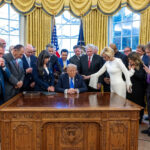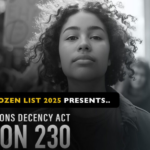WASHINGTON (BP)—Publishing or distributing sexually explicit material of a person without their consent is now a federal crime, and social media platforms and other websites must remove such images within 48 hours of notification.
President Donald Trump signed into law May 19 the bipartisan Take It Down Act, introduced by Sen. Ted Cruz, R-Texas, and Sen. Amy Klobuchar, D-Minn.
The law criminalizes nonconsensual images including AI-generated content commonly called “deepfake pornography,” as well as video images and photography either created without the subject’s consent or distributed without such consent.
Cruz called the signing of the bill “a historic win for victims of revenge porn and deepfake image abuse.”
“Predators who weaponize new technology to post this exploitative filth will now rightfully face criminal consequences, and Big Tech will no longer be allowed to turn a blind eye to the spread of this vile material,” he said.
Klobuchar said the legislation “protects victims of online abuse and sets some rules of the road for social media and AI.”
Both Cruz and Klobuchar expressed appreciation to First Lady Melania Trump for her advocacy on behalf of the bill.
In a statement released on social media, the Southern Baptist Convention Ethics & Religious Liberty Commission said Southern Baptists “applaud” Trump’s signing the bill.
“Because pornography is a distortion of God’s gift of sexuality, a violent assault on the imago Dei, and a corrosive plague upon individuals, families, churches, and society, we will continue to advocate for policies that keep this material from our public spaces,” the ERLC statement said.
Image-based sexual abuse a growing problem
Image-based sexual abuse affects a growing number of people, watchdog groups say, with the pornography industry fueling the abuse.
A March study released by Thorn, in partnership with Burson Insights, found 1 in 8 young people personally knew someone under the age of 18 targeted by deepfake porn, or knew someone who had used deepfake technology against another minor.
The National Center on Sexual Exploitation and the Parents Television and Media Council, two groups invited to the White House lawn to witness the signing, applauded the new law inspired by Elliston Berry, a survivor of deepfake image-based sexual abuse committed when she was 14.
“It would be hard to overestimate the incredible impact this new law will have,” NCOSE said in a press release, emphasizing that with the explosion of AI tools, “anyone can be victimized through [image-based sexual abuse] within seconds.”
“The notice and takedown provision established by the Take it Down Act is similar to copyright law, which means we already know it works,” NCOSE stated. “Image-based sexual abuse will now be removed as quickly as copyrighted material, like Disney movies, are removed from YouTube.”
Law offers relief for survivors
Parents Television and Media Council Vice President Melissa Henson said the new law provides relief for survivors, including children.
“Of all the online threats to children, deepfake pornography might be the most insidious, because anyone—even children and teens who aren’t online or don’t use social media—can fall victim to it,” Henson said.
“To witness the signing of the bill into law, along with families whose children have been victimized by deepfake pornography or sextortion, was bittersweet, but will serve as a powerful reminder of the difference people can make when they advocate for solutions that will protect future generations.”
In an uncommon show of bipartisan support, only two members of Congress voted against the Take it Down Act when it passed in April, Republican representatives Thomas Massie of Kentucky, who has called the legislation “a slippery slope, ripe for abuse, with unintended consequences;” and Eric Burlison of Missouri, who has said it is redundant and federalizes crimes addressed in state law. The act passed the U.S. Senate unanimously.
Penalties for violating the Take it Down Act include prison sentences of up to three years for crimes committed against individuals under the age of 18, and up to two years for crimes committed against adults, with concurrent financial fines, the act stipulates.
Trump signed the act on the heels of NCOSE’s May 13 release of the report, “Not a Fantasy: How the Pornography Industry Exploits Image-Based Sexual Abuse in Real Life,” a detailed look at pornography’s global impact on image-based sexual abuse.
NCOSE defined image-based sexual abuse as “a violation of persons that includes the theft, creation, and distribution of sexually explicit material without the meaningful consent of the persons depicted, or the manipulation of nonexplicit material for the purpose of making it pornographic.”
NCOSE includes in the definition nonconsensual distribution of sexually explicit images or videos, recorded sexual violence, video voyeurism, and nonconsensual creation or distribution of AI-generated forged pornography.
With additional reporting by Managing Editor Ken Camp.















We seek to connect God’s story and God’s people around the world. To learn more about God’s story, click here.
Send comments and feedback to Eric Black, our editor. For comments to be published, please specify “letter to the editor.” Maximum length for publication is 300 words.